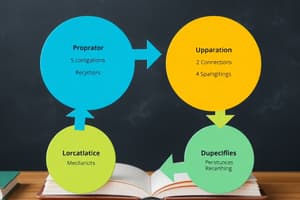Podcast
Questions and Answers
What is the definition of education?
What is the definition of education?
Education is the process of acquiring knowledge, skills, values, and attitudes through various means, including teaching, training, and research.
What are the three levels of education?
What are the three levels of education?
The three levels of education are primary, secondary, and higher education.
Describe the main focus of constructivism in education.
Describe the main focus of constructivism in education.
Constructivism emphasizes active learning and the construction of knowledge through experiences.
What does inclusive education aim to achieve?
What does inclusive education aim to achieve?
What are some current trends in education?
What are some current trends in education?
Flashcards are hidden until you start studying
Study Notes
Overview of Education
- Definition: Education is the process of acquiring knowledge, skills, values, and attitudes through various means, including teaching, training, and research.
Types of Education
-
Formal Education:
- Structured learning typically occurring in schools.
- Follows a standard curriculum and leads to certificates or degrees.
-
Informal Education:
- Unstructured, non-institutional learning.
- Occurs through daily interactions and experiences.
-
Non-formal Education:
- Organized educational activities outside the formal system.
- Includes community education, adult education, and lifelong learning.
Levels of Education
-
Primary Education:
- Basics of literacy, numeracy, and foundational skills.
- Usually for children aged 6-11 years.
-
Secondary Education:
- Builds on primary education, often including specialized subjects.
- Typically for adolescents aged 12-18 years.
-
Higher Education:
- Advanced learning through universities and colleges.
- Leads to degrees such as associate, bachelor’s, master’s, and doctoral.
Educational Theories
-
Behaviorism:
- Focuses on observable behaviors and the responses to environmental stimuli.
-
Constructivism:
- Emphasizes active learning and the construction of knowledge through experiences.
-
Cognitivism:
- Centers on the mental processes involved in learning, such as memory and problem-solving.
Key Concepts in Education
- Pedagogy: The art and science of teaching, including methods and strategies.
- Curriculum: The subjects and materials used in an educational system.
- Assessment: The process of evaluating student learning and performance.
Current Trends in Education
- Technology Integration: Use of digital tools and resources in the classroom.
- Inclusive Education: Ensuring all students, regardless of background or ability, have access to quality education.
- Lifelong Learning: The ongoing, voluntary, and self-motivated pursuit of knowledge for personal or professional development.
Challenges in Education
- Access and Equity: Disparities in educational opportunities based on socioeconomic status, geography, and disability.
- Quality of Education: Variations in teaching quality and resources available to students.
- Globalization: The impact of global communication and technology on educational practices and standards.
Importance of Education
- Promotes personal and social development.
- Enhances critical thinking and problem-solving skills.
- Contributes to economic growth and social cohesion.
Overview of Education
- Education involves acquiring knowledge, skills, values, and attitudes through teaching, training, and research.
Types of Education
- Formal Education:
- Structured learning environment typically in schools, adhering to a standard curriculum, culminating in certificates or degrees.
- Informal Education:
- Unstructured learning occurring through daily interactions, experiences, and social contexts.
- Non-formal Education:
- Organized programs outside the formal education system, encompassing community education, adult education, and lifelong learning initiatives.
Levels of Education
- Primary Education:
- Focuses on fundamental literacy, numeracy, and foundational skills, targeted at children aged 6-11 years.
- Secondary Education:
- Expands upon primary education with specialized subjects, aimed at adolescents aged 12-18 years.
- Higher Education:
- Involves advanced studies at universities or colleges, leading to various degrees (associate, bachelor’s, master’s, and doctoral).
Educational Theories
- Behaviorism:
- Concentrates on observable behaviors and responses influenced by environmental stimuli.
- Constructivism:
- Advocates for active learning and knowledge construction through real-life experiences.
- Cognitivism:
- Focuses on mental processes involved in learning, such as memory retention and problem-solving techniques.
Key Concepts in Education
- Pedagogy:
- Refers to the art and science of teaching, encompassing diverse instructional methods and strategies.
- Curriculum:
- Constitutes the subjects and educational materials taught within a school system.
- Assessment:
- The evaluation process used to measure student learning outcomes and performance.
Current Trends in Education
- Technology Integration:
- Incorporation of digital tools and resources to enhance classroom learning and engagement.
- Inclusive Education:
- Strives to provide quality education to all students, irrespective of their backgrounds or abilities.
- Lifelong Learning:
- Represents the continuous, voluntary pursuit of knowledge for personal or professional development throughout one’s life.
Challenges in Education
- Access and Equity:
- Highlights inequalities in educational opportunities due to socioeconomic status, geographic location, and disabilities.
- Quality of Education:
- Addresses disparities in teaching quality and the availability of resources for students.
- Globalization:
- Examines how global communication and technology influence educational practices and standards worldwide.
Importance of Education
- Fosters personal growth and social development.
- Enhances critical thinking and problem-solving capabilities.
- Contributes to economic advancement and societal cohesion.
Studying That Suits You
Use AI to generate personalized quizzes and flashcards to suit your learning preferences.




